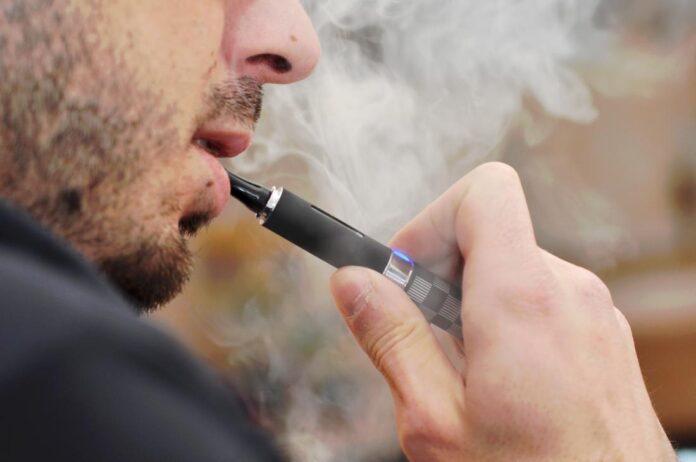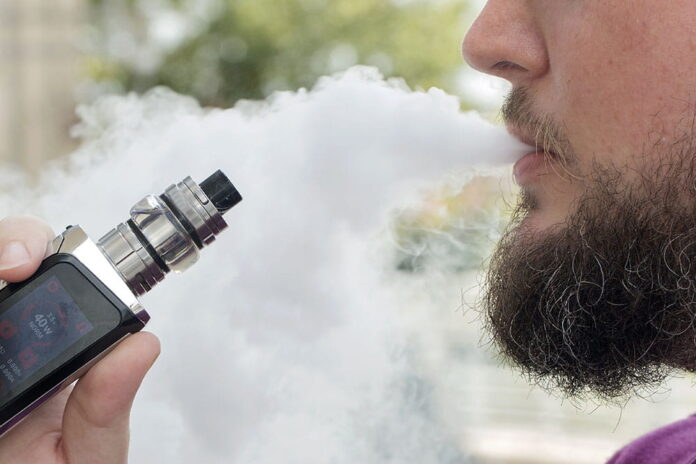The use of electronic cigarettes, also known as “vaping,” is becoming growingly popular among people who are trying to quit smoking or looking for an alternative way to enjoy nicotine. It creates an aerosol by heating a liquid that contains nicotine, flavorings, and other chemicals. When you take a puff from the device, your body absorbs the nicotine into your bloodstream.
While research is still emerging on the long-term effects of vaping, the immediate effects of inhaling the vapors of an e-cigarette are not yet fully understood. Depending on how often and how heavily you vape, these immediate effects could range from minor irritation to dizziness and coughing. How you react will depend on what chemicals were used in creating the vape juice and given that each brand carries a distinct formula, it may take some experimentation to find one that works for you.
The Effects of Vaping

The first time you experience vaping, you may notice some effects immediately. Most new users describe a feeling of relaxation and well-being when inhaling their vape, especially when using nicotine-based products. Studies have found nicotine to stimulate the release of dopamine, which is responsible for the feeling of pleasure most people experience from vaping. Check out DashVapes to find out more about vaping and the products available.
It’s important to note that although the first few times you vape can be enjoyable, frequent use may alter your brain chemistry as it adapts to the nicotine in the vaporized fluid. Increasingly higher doses of nicotine in your vaporizer will cause your body to develop a physical tolerance or dependence, and continual use could lead to an addiction. As with any kind of drug use, addiction potential increases significantly with frequency and quantity consumed.
Additionally, individual reactions vary depending on factors such as age, metabolism rate, and the types of compounds that are used in the vaporizer juice (e-juice). Many compounds found in more sophisticated e-juices can trigger a range of allergic reactions from mild irritation to full-blown anaphylactic shock among users who are predisposed to certain allergies or sensitivity levels.
Research on long-term effects is ongoing; however, it’s been suggested that prolonged exposure to especially high levels of propylene glycol (PG) in e-juices has potential health risks including reduced fertility and cancerous cell growth caused by metal particles released by coil heating elements at high wattages over extended periods of time.
It’s best practice for anyone considering vaping as an activity or habit to take prudent precautions such as monitoring frequencies and strength levels while avoiding anything beyond mild concentrations in order to mitigate any potential risks associated with this form of inhalation therapy.
Short-Term Effects

When you vape for the first time, you may experience irritation and discomfort. This is because when you inhale vapor containing nicotine, it travels through your lungs and into your bloodstream. When nicotine enters your bloodstream, it acts on the same receptors in your brain as cigarettes do. This causes a range of short-term effects, such as:
- Increased heart rate
- Increased blood pressure
- Headache
- Nausea
- Blurry vision
- Lightheadedness
- Sweating
- Feeling tired
In addition to these physical effects, vaping may also affect your mood. Some people feel relaxed while others may feel jittery or agitated. Nicotine can act like a stimulant in low doses and a sedative in higher doses. As such, it can have both calming and energizing effects on the body when vaped.
Long-Term Effects

The long-term effects of vaping are not yet known as the habit has only become widespread in the last few years. However, some research suggests it may have serious health consequences. Vaping exposes users to nicotine, ultrafine particles, volatile organic compounds, and heavy metals and could be toxic to some cells in the lungs.
Additionally, non-nicotine vaporizers may also pose risks to your health. According to a study by Mayo Clinic, exposure to diacetyl – an additive used in many e-cigarettes– can affect the lungs’ air sacs and cause inflammation that can lead to fatigue and wheezing. Diacetyl is also considered a potential carcinogen by the US National Toxicology Program.
Evidence shows that vapers could be at risk of developing bronchiolitis obliterans (also known as ‘popcorn lung’). This condition is associated with inflammation of smaller airways in the lungs caused by inhalation of hazardous chemicals such as diacetyl or acetyl propionyl which are added to flavors during the manufacturing of vaping liquids and certain common foods such as popcorn flavoring butter. Symptoms include coughing, shortness of breath, and wheezing which can be made worse over time if exposure continues without treatment or prevention measures being taken.
Benefits of Vaping

Vaping results in significantly fewer health risks than smoking cigarettes because it does not produce tar or carbon monoxide. Additionally, any potential carcinogens in e-liquids or aerosols produced when vaping are typically at much lower levels than what is found when smoking tobacco cigarettes.
The act of inhaling and exhaling from a vape produces deeper and more frequent breaths that keep airways moist and likely give the user’s lungs an opportunity to cleanse themselves of harmful substances. Vaping is also known to provide relaxing effects that help reduce stress and anxiety, which can be beneficial for smokers looking to quit their habit.
Apart from the physical benefits of switching from smoking to vaping, many people find emotional support through being part of the vaping community – something that can be invaluable for people transitioning away from smoking habits.
How to choose the right vape for you
Choosing the right vape for you can be a daunting task, especially with so many options available in the market. However, there are some key factors to consider when making your decision.
Firstly, determine your vaping style and preferences. Do you prefer a mouth-to-lung or direct-to-lung hit? What type of e-liquid do you like to use?
Next, consider the device’s size, battery life, and ease of use. Do you want a small, portable device or a larger, more powerful one? How long do you need the battery to last?
Finally, think about your budget and do some research on reputable brands and products like IndeJuice. Look for reviews and feedback from other vapers to help make an informed decision.
Conclusion
Vaping has been linked to addiction and may negatively affect your lungs and cardiovascular system, as well as other parts of your body. It is important to understand the short-term and long-term effects of vaping before beginning to use it.
Safety guidelines exist for using e-cigarettes responsibly. Talk with your doctor if you’re considering using an e-cigarette as they can provide personally tailored advice in regards to risks associated with this habit—especially if you are an existing smoker or have existing health conditions that may be impacted by vaping. Ultimately—consulting with an expert is always recommended before beginning to vape so that you are better prepared for any unexpected consequences associated with this habit in the future.







